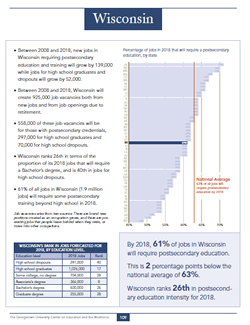The UW System Board of Regents examined workforce development, economic prosperity, and the ways that UW institutions affect the state’s economic health and vitality at their meeting on Nov. 8.
Expert presentations illustrated national demographic and economic trends and how those forces may lead to workforce challenges. Separate reports from the Georgetown University Center on Education and the Workforce as well as Competitive Wisconsin indicate that the need for a college-educated workforce is increasing, both nationally and in Wisconsin, and at a more rapid rate than the demand for workers without postsecondary training.

Between 2008 and 2018, Wisconsin will create 925,000 job vacancies both from new jobs and from job openings due to retirement. More than 550,000 of these job vacancies will be for people who have postsecondary credentials. By 2018, 61% of all jobs in Wisconsin (1.9 million jobs) will require some postsecondary training beyond high school.
The Regents heard from Dr. Anthony P. Carnevale, from Georgetown University, who discussed his projections on jobs and education requirements. He is the lead author of “Help Wanted: Projections of Jobs and Education Requirements Through 2018,” which includes both national and state-level projections.
Next, Rebekah Kowalski, from Manpower Group’s Right Management, focused on Wisconsin’s future workforce challenges. She led the firm’s work on “Be Bold 2: Growing Wisconsin’s Talent Pool.” In that report is an assessment of five “skills clusters” that are critical to more than half of the state’s Gross Domestic Product (GDP).
UW and other institutions of higher education are increasingly being asked by businesses, policymakers, students, and families to address the “skills gap” by producing more graduates who are trained in specific disciplines, to meet immediate needs in today’s job market. At the same time, institutions of higher education are also being asked to continue their historic role of producing educated and engaged graduates who will strengthen their communities and are prepared to succeed in the workforce over the long-term.
